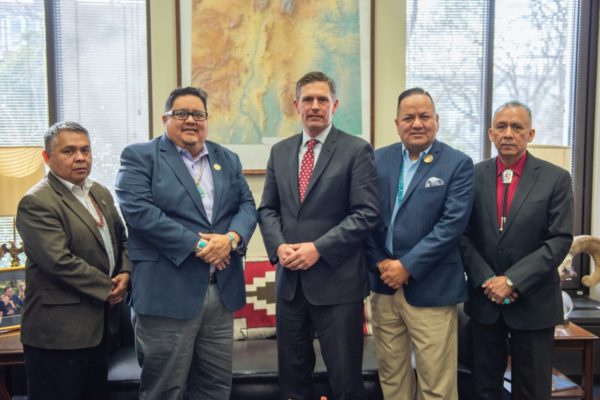
- Details
- By Native News Online Staff
WASHINGTON — The Navajo Nation Council sent a delegation, led by Navajo Nation Council Speaker Seth Damon, to Washington this pastlast week to ensure local Navajo voices are heard and considered before further federal action is taken on the Chaco Culture National Historical Park.
The Navajo Nation is opposed to the drilling that the Trump administration wants to allow near Chaco Canyon, which is considered a sacred site to Native people.
Located in northernwestern New Mexico, Chaco Canyon is home to thousand-year-old dwellings and artifacts of the Pueblo culture. Managed by the National Park Service, it is one of only 20 World Heritage sites in the U.S., as designated by the United Nations Educational, Scientific and Cultural Organization (UNESCO).
It is protected as a National Cultural Historic Park and is designated as a United Nations (UN) World Heritage Site. As the UNUNESCO notes, among many other remarkable features, the site “has an ancient urban ceremonial center that is unlike anything constructed before or since.”
“As representatives of the Diné people, our goal is to ensure that the allottees and the communities immediately surrounding Chaco Culture National Historical Park are heard before any decisions by Congress are made,” said Speaker Damon.
Sen. Martin Heinrich (D-N.M.), who is on the Senate Committee on Energy and Natural Resources, is cosponsoring Senate Bill 1079. The bill, also called the Chaco Cultural Heritage Area Protection Act of 2019, is being sponsored by Sen. Tom Udall (D-N.M.). The bill proposes an exclusion zone on development of federal minerals in an area of approximately 10 miles surrounding the historical park.
Chaco Culture National Historical Park is surrounded by the Navajo communities of White Rock, Nageezi, Counselor, Pueblo Pintado, White Horse Lake, and others in New Mexico.
“The issue is that we have Navajo families and allottees, especially in Nageezi, that live inside the proposed buffer that want the opportunity to speak directly before members of Congress before a final vote takes place,” said Navajo Council Delegate Mark Freeland during his visit to Capitol Hill to speak to staff members of several senators.
More Stories Like This
Native News Weekly (August 25, 2024): D.C. BriefsUS Presidents in Their Own Words Concerning American Indians
DHS Secretary Noem Tells Tribes ICE Does Not Target Native Americans
Native News Online Marks 15 Years of Warrior Journalism
I’m a Minneapolis Postal Worker. This Is What I Saw.
Help us defend tribal sovereignty.
At Native News Online, our mission is rooted in telling the stories that strengthen sovereignty and uplift Indigenous voices — not just at year’s end, but every single day.
Because of your generosity last year, we were able to keep our reporters on the ground in tribal communities, at national gatherings and in the halls of Congress — covering the issues that matter most to Indian Country: sovereignty, culture, education, health and economic opportunity.
That support sustained us through a tough year in 2025. Now, as we look to the year ahead, we need your help right now to ensure warrior journalism remains strong — reporting that defends tribal sovereignty, amplifies Native truth, and holds power accountable.
 The stakes couldn't be higher. Your support keeps Native voices heard, Native stories told and Native sovereignty defended.
The stakes couldn't be higher. Your support keeps Native voices heard, Native stories told and Native sovereignty defended.
Stand with Warrior Journalism today.
Levi Rickert (Potawatomi), Editor & Publisher

